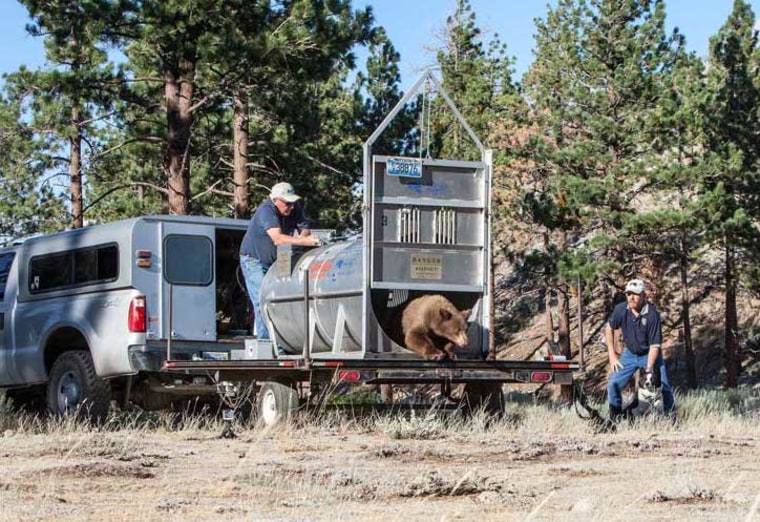A black bear stopped skiers in their tracks and made headlines last week when it ran across a busy ski slope near Lake Tahoe. January is usually peak hibernation season, but Nevada wildlife officials say many bears have been skipping or delaying their months-long snoozes in favor of loitering near houses and businesses to rifle through trash bins. The reason for the change in behavior: year on year of dry winters and an abundance of garbage in easy reach.
"Over the years during the light winters, some bears will sleep five or six days out of the week and wake up on garbage days when they know there will be garbage available," Chris Healy, spokesperson for the Nevada Department of Wildlife, told NBC News.
Last year was a dry year, and the NDOW responded to 97 bear calls. In 2009, a good year for snow, the rangers were only called out for about 40 bears.
Between 400 and 700 bears live in Nevada, and about 40 percent of those live in the Lake Tahoe region, according to NDOW estimates. The Incline Village region in the north and the Heavenly Mountain Resort in the south are a source for many bear calls.
In general, hibernating bears can be woken by human activities or disturbance, and a lack of food before the winter. Food available during winter can draw them out as well, Lynne Nelson, associate professor at Washington State University who studies cardiac rhythms in hibernating bears, wrote to NBC News in an email.
Nevada isn't alone. A mild Nordic winter has woken bears in Finland, and warmer weather in California has delayed hibernation for some bears out and about in Yosemite National Park. Wandering bears have been spotted in Juneau, Alaska as well.
"I suspect there could be a combination of effects," Nelson said. For example, warm weather draws out bears who are tricked into thinking it's spring. When colder weather returns, they return to their den to sleep.
Skipping a regular hibernation cycle could affect the health of the bears. Studies in other hibernating species show that hibernating individuals tend to be healthier than those that don't power down for the winter, Nelson said.
Being out and about also increases chances of run-ins with humans. The ski slope runner had a "happy ending," Healy said, and NDOW is sometimes forced to euthanize unlucky animals who have broken into houses and pose a threat. If the bears can be captured and released in nearby woodland, the NDOW does that instead.
If early 2014 turns out dry, the NDOW is bracing for many more bear calls this year.
Nidhi Subbaraman writes about science and technology. You can follow her on Facebook, Twitter and Google+.
